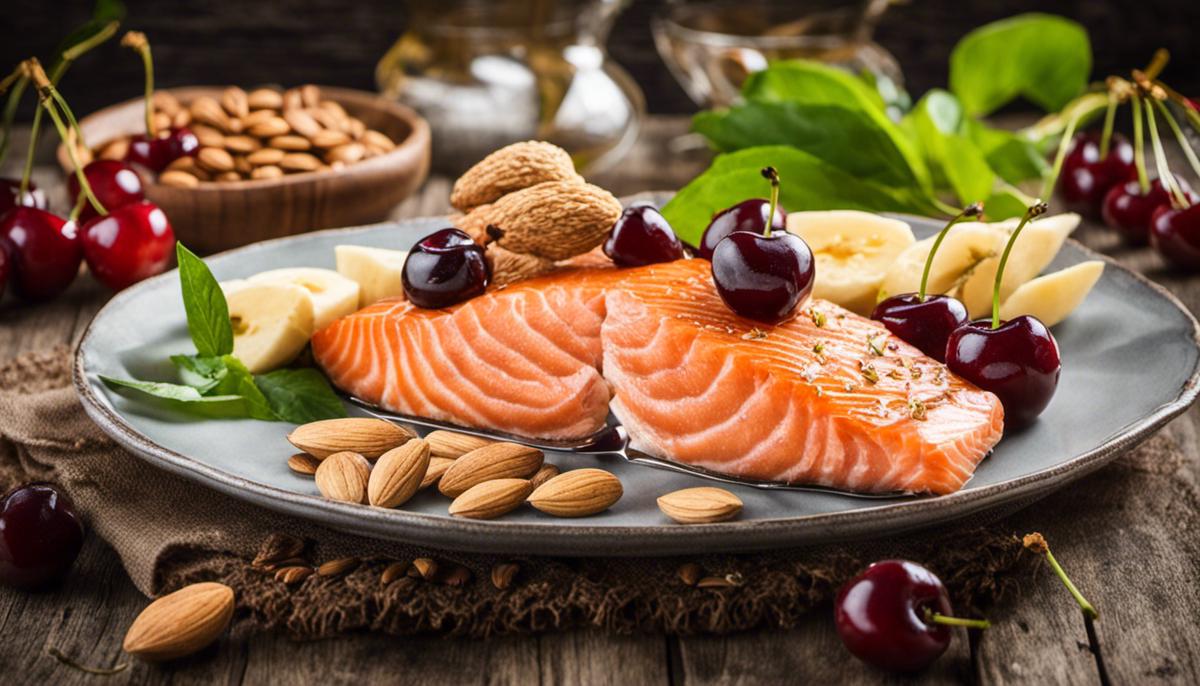Being mindful of nutrition plays more than just a role in our overall wellbeing – it can also have a significant impact on the quality and duration of our sleep. A diverse range of factors, ranging from the timing of our meals to the nutritional value of the foods we consume, interact to influence our sleep patterns and cycles. This essay presents an in-depth study about their relationship, highlighting how the foods we consume can either obstruct or enhance sleep. The aim is to help individuals and families optimize their diet for a better night’s sleep. It underscores the essential information about certain sleep-friendly foods which can be seamlessly integrated into the family’s meals and presents practical tips on establishing a night-time dietary routine favourable for sleep.
Understanding the Connection Between Food and Sleep
Nourishment and Nod: How Our Diets Influence Our Sleep
There’s a warm, cozy feeling when the kids are tucked in, the house is quiet, and it’s finally “me-time”, right parents? It’s a wind-down window, an opportunity to finally settle in bed for a good night’s rest. But how many times have we found ourselves lost in the abyss of tossing and turning, unable to fall asleep, even though we are absolutely exhausted? Plenty we’d guess.
The culprit could be what was on the dinner menu. Yes, parents, what we consume doesn’t just affect our waistline but also our sleep quality. Deriving from experts’ research, these insights will surely get us thinking about how food impacts those peaceful Zzz’s.
A healthy diet is often associated with better sleep patterns. Whole foods, particularly fruits, vegetables, lean proteins, and whole grains, help to improve sleep quality. Eating these nutrient-rich foods provide our bodies with essential vitamins and minerals, contributing to a more rested and restorative sleep.
On the flip side, diets high in sugar and saturated fats have been linked to lighter, less restorative sleep with more awakenings throughout the night. Consuming larger meals, especially close to bedtime, can lead to a plethora of sleep disturbances. Heartburn and indigestion are the unwelcome guests that appear when we overload our stomach just before hitting the sack.
Ever heard of the sleep hormone melatonin? Our bodies naturally produce it, and it plays a crucial role in our sleep cycle. Interesting fact, certain foods can actually boost this hormone in our bodies. Cherries, corn, asparagus, tomatoes, pomegranate, olives, grapes, broccoli, and cucumbers are rich in melatonin. Even more, foods like nuts and seeds, eggs, fish, and white or red meat contain a sleep-enhancing amino acid called tryptophan.
Mind you, it’s not just about what we eat, when we eat matters too. Consuming caffeine even six hours before bedtime can rob an hour of sleep. Similarly, alcohol may help you fall asleep faster initially, but disrupts deep REM sleep cycles later.
Our busy lives often challenge us to maintain a perfect diet, and that’s totally okay. Small, positive changes can lead to enormous benefits in sleep quality. Consider starting with manageable changes. Perhaps swap the after-dinner ice cream for a bowl of cherries, or switch the late-night caffeine hit with a warm chamomile tea.
Remember, embracing these healthy habits doesn’t only lead to a good night’s rest but builds a solid foundation for our overall health and wellbeing. Because as we all know, when we’re well-rested, those parenting duties somehow become a little easier. Treating our bodies to nourishing foods and quality sleep isn’t an act of selfishness, rather it’s self-care at its best. And trust us, our families will thank us for it. We can consider it another little gift of love, one delicious bite and blissful sleep at a time. Sweet dreams, parents!

Sleep-friendly Foods to Include in Your Family’s Diet
Explore Foods that Foster a Night of Blissful Slumber
Delving deeper into the fascinating correlation between diet and sleep reveals a treasure trove of foods that can potentially lead to better sleep nights. This reservoir of knowledge is complemented by understanding the strategic ingestion of certain types of food items. This pursuit is more than just about what to eat, but also when and how to take those foods to reportedly enhance our sleeping patterns, especially in the seclusion of night, drawing us into the realm of sweet dreams and restful slumber.
Let’s sidestep from commonly known sleep-enhancing foods with rich sources of melatonin and tryptophan. Straying away from the standard evening cup of chamomile tea, and broaden our horizons with other foods that are true allies of good night-time rest.
Carbohydrates don’t always wear the villain cape; in fact, when it comes to promoting sleep, some carbohydrates might play a crucial role. Whole grains, like brown rice, oatmeal, and whole-wheat bread are high in complex carbohydrates and provide the necessary nutrients for better quality sleep. More so when paired with a protein source, causing a rise in the sleep-inducing amino acid, tryptophan.
Antioxidant-rich fruits could prove to be your new night-time snack. Cherries, especially tart ones, are packed with melatonin. And the natural sugars in fruits like bananas and pineapples can aid in reducing levels of sleep disorders, with their high concentration of melatonin.
On the other side of the spectrum are fatty fish such as salmon, tuna, and mackerel, known for their health benefits. They are abundant sources of vitamin D and omega-3 fatty acids, a potent duo that enhances sleep by improving the production of serotonin, a sleep-regulating hormone.
Magnesium is another nutrient that plays a significant role in our sleep process and can be found abundantly in certain foods. Magnesium-rich foods like spinach, avocados, and almonds can promote better sleep by reducing inflammation and stress, and by helping our muscles relax.
Besides understanding the specifics of what to consume, eating habits also play an essential role. Lighter meals before bedtime can help prevent sleep disruptions that are commonly associated with digestion and heartburn.
Maintaining hydration levels by drinking adequate water throughout the day can also facilitate better sleep. However, it’s best to limit liquid intake closer to bedtime to avoid disruptive bathroom trips during the night.
Navigating the freeway of rules and suggestions concerning nutrition and sleep might become overwhelming, just remember, moderation is vital. Understanding the specific needs of your body and keeping consistent with your sleep hygiene practices will be invaluable in enhancing your overall sleep quality. Everyone is different and figuring out which dietary changes work best for you can be a process of trial-and-error. So, take the journey slow, savor small steps, and celebrate the victories, no matter how small.
Your turn has come to perceive food not just as a source of energy or a tantalizing pleasure, but also as a facilitator of restful sleep. Begin with baby steps, make healthier food choices, and watch how these changes reflect in the quality of sleep and overall wellbeing. Unfurl the sails and embark on this voyage of discovering the fascinating world where dietscape converges with sleep, leading to healthier life choices and even better mornings.

Creating a Night-time Dietary Routine for the Family
Developing a dietary routine to support sleep is as essential as homecooked meals for family bonding. We’ve previously discussed how our diets influence sleep quality, and the role of certain foods and eating practices in promoting quality sleep. Now, let’s delve deeper into the strategic choices we can make as parents and caregivers.
First and foremost, let’s talk carbs. High-quality, complex carbohydrates are a welcome addition to the dinner plate. Why? They aid the release of insulin, which helps tryptophan to enter the brain and induce a good night’s sleep. Oats, barley, whole grains, and other sleep-enhancing carbohydrates might be a good step toward a sound sleep for the entire family.
Next, fill the family’s plates with antioxidant-rich fruits. Berries, plums, oranges, and cherries are great sources of antioxidants. Cherries are especially beneficial as they are rich in melatonin, a sleep hormone.
Thirdly, incorporate fatty fish into the family menu. Fatty varieties like salmon, trout, and albacore are not only a source of Omega-3 fatty acids but also vitamin D. Both work in tandem to enhance the production of serotonin, which regulates sleep.
Fourth, consider adding magnesium-rich foods, because magnesium deficiency can cause insomnia and sleep disorders. Foods like leafy greens, nuts, seeds, and whole grains are excellent sources.
For dinner, lighter meals are favorable. A dinner that’s too heavy might disrupt sleep and lead to indigestion. Also, remember that while it is essential to stay hydrated, too much water close to bedtime might result in frequent trips to the bathroom, interrupting a peaceful sleep cycle.
Change, they say, is constant – but it should be moderate, especially when it comes to dietary changes. It’s essential to make small dietary adjustments suited to each person’s everyday routines and preferences. After all, every individual in the family is unique, and there is no one-size-fits-all when it comes to diet.
Lastly, let’s appreciate food as a tool that aids in restful sleep. The simple practice of mindful eating can help the family understand the connection between food and sleep. In this way, we can turn our kitchens into little sleep labs, intuitively preparing meals that nourish our bodies, enhance our sleep, and promote overall wellbeing.
By incorporating these practices into our daily routine, we can strengthen not only our bodies but also ensure restorative, quality sleep for the whole family. Here’s to better eating habits and sound sleep.

Understanding and leveraging the intricate relationship between nutrition and sleep can significantly improve the quality of life and well-being of any family. By incorporating sleep-friendly foods into the family’s diet, adjusting meal timing, and upholding a regular nightly dietary routine, it is possible to encourage healthier, restful and more restorative sleep. Remember, what we eat is not the only determinant of good sleep – adequate physical activity, stress management, and maintaining an overall balanced lifestyle are also indispensable. May the knowledge imparted in this essay serves as a stepping stone towards achieving a better sleeping pattern and in turn, to a healthier and rejuvenated life.
